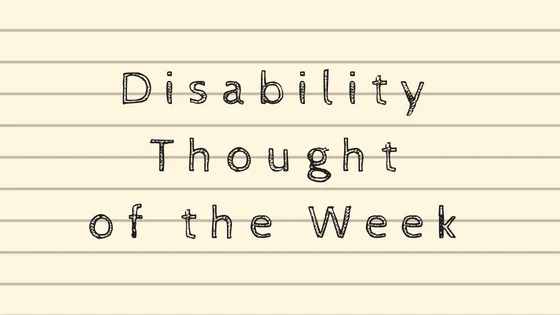Disability Thought Of The Week: Platitudes
/I am starting to think that there’s a single phenomenon we don’t talk about directly in disability culture, but which is at the core of most of the everyday personal foolishness that bothers and annoys disabled people. That single thing is platitudes.
Wikipedia — platitude:
A platitude is a trite, meaningless, or prosaic statement, often used as a thought-terminating cliché, aimed at quelling social, emotional, or cognitive unease.
Platitudes have been criticized as giving a false impression of wisdom, making it easy to accept falsehoods:
A platitude is even worse than a cliché. It’s a sanctimonious cliché, a statement that is not only old and overused but often moralistic and imperious. ... [P]latitudes have an aphoristic quality, they seem like timeless moral lessons. They therefore shape our view of the world, and can lull us into accepting things that are actually false and foolish.
Platitudes often take the form of tautologies, e.g., "it is what it is", making them appear vacuously true. But the phrase is used to mean "there is no way of changing it", which is no longer a tautology: "Structuring the sentiment as a tautology allows it to appear inescapable."
At the same time, some phrases that have become platitudes may provide useful moral guidance, such as "do unto others as you would have them do unto you". Others, though widely trivialized, may be thought-provoking, such as "Be the change you wish to see in the world".
In disability culture, most platitudes come from non-disabled sources who are apparently trying to “quell” the “social, emotional, or cognitive unease” provoked by our disabilities. And you find platitudes forming the backbone of all that we despise in:
Journalism: “Disability doesn’t stop local teen from pursuing her dreams.”
Motivational memes: “What’s YOUR excuse?” [captioning a photo of a disabled person doing anything unexpected].
Advice: “Look at a disabled person’s abilities, not their disabilities!”
The most interesting thing in the Wikipedia definition is that platitudes are usually true, or at least based on some kind of truth. There’s truth on all of the above examples of disability platitudes, including in most full-blown “inspiration porn.” It’s the blandness, repetition, over-simplicity, and above all the misuse of these truths about disability that make them platitudes. Unfortunately, platitudes about disability seem to be the only way some people seem capable of processing disability. Even some disabled people traffic in disability platitudes, especially during stages in our lives where we are struggling to understand our own disability experiences. But even when they are forgivable, disability platitudes are always cringe-worthy,
See also: bromide, cliché, inspiration porn











